- Home
- Rosamunde Pilcher
Another View Page 2
Another View Read online
Page 2
“My mother and your father are not going to approve.”
“It doesn’t matter if they approve or not,” said Emma. “We’ve found each other again. For the moment, that’s all that matters.”
* * *
Above them, the loudspeakers gave a click, began to speak with a feminine voice.
“Ladies and gentlemen. Air France announce the departure of their flight Number 402 for London…”
“That’s me,” said Emma.
They stubbed out their cigarettes, stood up, began to gather in the baggage. Christopher took the canvas grip and the Prisunic paper carrier, and the great bulging basket. Emma slung the raincoat over her shoulder, carried her handbag, the ski-boots and the hat.
Christopher said, “I wish you’d wear the hat. It really would complete your ensemble.”
“It would blow off. Not to say look funny.”
They went downstairs, crossed the expanse of shining floor towards the barrier where a small queue of passengers was already forming.
“Emma, are you going down to Porthkerris to-day?”
“Yes, I’ll get the first train I can.”
“Have you got any money? Pounds, shillings and pence, I mean?”
She had not thought of this. “No. But it doesn’t matter. I’ll cash a cheque somewhere.”
They joined the queue behind a British business man who carried only his passport and a slim briefcase. Christopher leaned forward.
“Oh, sir, I wonder if you could help.”
The man swung round, and found to his surprise Christopher’s face only inches from his own. Christopher was wearing his sincere expression. “I am sorry, but we’re in rather a predicament. My sister’s returning to London, she’s not been home for six years, and she has such a lot of hand luggage, and she’s only just recovered from a serious operation…”
Emma remembered Ben saying that Christopher never told a small lie if he could get away with a bigger one. Looking at him as he came out with this outrageous fabrication, she decided that he had chosen his career wisely. He was a wonderful actor.
The business man, thus approached, could make no excuse.
“Well, yes, I suppose…”
“It’s more than kind of you…” The canvas grip and the carrier with the bread went under one arm, the basket in the other along with the slim brief case. Emma felt sorry for him.
“It’s just till we get onto the plane … it is so kind of you, and you see my brother isn’t coming with me…”
The queue moved forward, they had reached the barrier.
“Goodbye, darling Emma,” said Christopher.
“Goodbye, Christo.” They kissed. A brown hand whipped away her passport, riffled the pages, stamped it.
“Goodbye.”
They were divided by the barrier, by the formalities of the French government, by other travellers, surging forward.
“Goodbye.”
She would have liked him to wait and see her safely onto the plane, but even as she waved, flapping the sun hat, he had turned, and was walking away from her, the light shining on his hair, and his hands buried deep in the pockets of his leather coat.
2
In London, in February, it was raining. It had started to rain at seven o’clock in the morning, and it had rained without ceasing ever since. By half-past eleven only a handful of people had visited the exhibition, and those enthusiasts, one suspected, had simply come in order to get out of the rain. They shed wet raincoats and dripping umbrellas, and stood around, bemoaning the weather before they had even bought themselves a catalogue.
At eleven-thirty, the man came in to buy a picture. He was an American, staying at the Hilton, and he asked to see Mr. Bernstein. Peggy, the receptionist, took the card which he proffered, asked him politely if he would mind waiting for a moment, and then came through to the office to speak to Robert.
“Mr. Morrow, there’s an American outside by the name of…” she glanced at the card. “Lowell Cheeke. He was here a week ago, and Mr. Bernstein showed him the Ben Litton of the deer, and thought he was going to buy it, but he went off without making up his mind. Said he wanted to mull it over.”
“Have you told him Mr. Bernstein’s in Edinburgh?”
“Yes, but he can’t wait. He’s going back to the States the day after to-morrow.”
“I’d better see him,” said Robert.
He stood up, and while Peggy went to open the door and invite the American in, did a swift spring-clean of his desk, squaring some letters, emptying the ash tray into the wastepaper basket and shoving the basket under the desk with the toe of his shoe.
“Mr. Cheeke,” said Peggy, announcing the visitor like a well-trained parlourmaid.
Robert came around the desk to shake hands.
“How do you do, Mr. Cheeke? I’m Robert Morrow, Mr. Bernstein’s partner. I am sorry, I’m afraid he’s in Edinburgh to-day, but perhaps I could help you…?”
Lowell Cheeke was a short, powerful-looking individual in a dacron raincoat and a narrow-brimmed hat. Both of these were very wet, indicating that Mr. Cheeke had not arrived in a taxi. He began divesting himself, with Robert’s help, from these sodden garments, and revealed an uncrushable navy blue terylene suit and a pin-striped nylon shirt. He wore rimless spectacles and behind them his eyes were cool and grey, and it was impossible to assess any sort of potential either financial or artistic.
“Thank you very much…” said Mr. Cheeke. “What a terrible morning…”
“It doesn’t look as though it’s going to let up either … A cigarette, Mr. Cheeke?”
“No, thank you, I no longer smoke.” He coughed self-consciously. “My wife made me give it up.”
They grinned at this female idiosyncrasy. The grin did not reach Mr. Cheeke’s eyes. He reached for a chair and settled himself into it, hitching a polished black shoe across his knee. He already looked very much at home.
“I was in here a week ago, Mr. Morrow, and Mr. Bernstein showed me a painting by Ben Litton—your receptionist probably told you.”
“Yes, she did, the deer painting.”
“I’d like to see it again if I may. I’m returning to the States the day after to-morrow, and I have to make up my mind.”
“But of course…!”
The picture waited for Mr. Cheeke’s decision, resting, where Marcus had left it, against the wall of the office. Robert drew the padded easel into the centre of the room, turned it towards the light, and gently lifted the Ben Litton into position. It was a large picture, an oil of three deer in a forest. Light filtered through the barely-suggested branches, and the artist had used a quantity of white which gave the work an ethereal quality. But its most interesting feature was the fact that it had been painted, not on stretched canvas, but on jute, and the coarser weave of this textile had blurred the artist’s brush, like the outlines of an action photograph taken at high speed.
The American swung his chair into position, and turned the cold beam of his spectacles onto the painting. Discreetly, Robert removed himself to the back of the room so as not to obtrude in any way upon Mr. Cheeke’s own assessment, and his own view of the painting was obscured by the round crew-cut head of his potential customer. Personally, he liked the picture. He was not a fan of Ben Litton’s. He thought his work affected and not always easy to understand—a reflection, perhaps of the artist’s own personality—but this swift sylvan impression was a thing to be looked at and lived with and never tired of.
Mr. Cheeke got out of his chair, moved up to the painting, examined minutely, backed away once more, and finished up leaning against the edge of Robert’s desk.
“Why do you suppose, Mr. Morrow,” he said, without turning round, “that Litton was inspired to paint it on burlap?”
The word burlap made Robert want to laugh. He longed to say irreverently, Probably had an old sack lying around but Mr. Cheeke did not look as though he would appreciate irreverence. Mr. Cheeke was here to spend money—always a serious busin
ess. Robert decided then that he was buying the Litton as an investment, and he hoped it would pay him off.
He said, “I’m afraid I have no idea, Mr. Cheeke, but it does give a most unusual quality to the work.”
Mr. Cheeke turned his head to send Robert a cold smile over his shoulder.
“You are not as well informed on such aspects as Mr. Bernstein.”
“No,” said Robert. “I’m afraid I’m not.”
Mr. Cheeke relapsed once more into contemplation. The silence settled and lasted. Robert’s own concentration had begun to wander. Small sounds intruded. The ticking of his own wrist watch. A murmur of voices from the other side of the door. The thunderous rumble, like distant surf, that was Piccadilly traffic.
The American sighed gustily. He began to feel in his pockets, one by one, searching for something. A handkerchief, perhaps. Some change for his taxi ride back to the Hilton. His attention had strayed. Robert had not convinced him that the Litton was worth buying. He was going to make some excuse and go away.
But Mr. Cheeke was simply searching for his pen. When he turned round, Robert saw that he already held his cheque book in the other hand.
Their business finally completed, Mr. Cheeke relaxed. He became quite human and even took off his glasses and stowed them away in a tooled leather case. He accepted the offer of a drink, and he and Robert sat for a little, with two glasses of sherry, and talked about Marcus Bernstein and Ben Litton, and the two or three paintings which Mr. Cheeke had purchased on his last visit to London, with which to form, with his latest acquisition, the nucleus of a small private collection. Robert told him about the retrospective Ben Litton exhibition which was being held in Queenstown, Virginia, in April, and Mr. Cheeke made a note of it in his diary, and then they both stood up, and Robert helped Mr. Cheeke into his raincoat, and gave him his hat, and they shook hands.
“I’ve enjoyed meeting you, Mr. Morrow, and doing business with you.”
“I hope we’ll see you next time you come to London.”
“Most certainly I shall pay you a visit…”
Robert held the door open and they moved out into the gallery. Bernstein’s were showing, that fortnight, a collection of bird and animal paintings by an obscure South American with an unpronounceable name, a man of humble origins, who had somehow, sometime, incredibly, taught himself to paint. Marcus had met him last year in New York, had been instantly impressed by his work, and invited him then and there to stage a London exhibition. Now, his brilliant pictures lined the straw-green walls of the Bernstein Gallery and on this gloomy morning seemed to fill the room with the verdancy and sunshine of a more salubrious climate. The critics had loved him. Since the exhibition opened ten days ago, the gallery had never once been empty, and within twenty-four hours there was not a picture that had not been sold.
At this moment, however, there were only three people in the gallery. One of them was Peggy, neat and unobtrusive behind her kidney-shaped desk, busy with the proofs of a new catalogue. Another was a black-hatted man, stooped as a crow, doing a slow round of inspection. The last was a girl, who sat, facing the office door, on the circular buttoned sofa in the middle of the room. She wore a bright green trouser suit and was surrounded by luggage, and appeared to have wandered into Bernstein’s under the mistaken impression that it was the waiting-room of a railway station.
Robert, with considerable self-possession, managed to behave as if she was not there. Together he and Mr. Cheeke moved across the thick carpet towards the main door, Robert’s head bent to catch the last of Mr. Cheeke’s small talk. The glass doors opened and swung shut behind them, and they were swallowed into the gloom of the dismal morning.
* * *
Emma Litton said, “Is that Mr. Morrow?”
Peggy looked up. “That’s right.”
Emma was not used to being ignored. The single swift glance had made her feel uncomfortable. She wished that Marcus was not in Edinburgh. She crossed her legs and then uncrossed them again. From outside came the sound of the departing taxi. In a moment, the glass door opened, once more, and Robert Morrow came back into the gallery. He did not make any comment, simply put his hands in his pockets, and calmly regarded Emma and her attendant chaos.
She decided that she had never, in her life, seen a man who looked less like an art dealer. His was the sort of face that, groggy and unshaven, is helped from a small sailboat at the end of a single-handed circumnavigation; or, darkly goggled, looks down from the peak of a previously unconquered mountain. But here, in the precious and rarefied atmosphere of the Bernstein galleries, he did not fit at all. He was very tall, wide-shouldered, long-legged; all this emphasised—and yet made incongruous—by his smoothly-tailored dark grey suit. In his youth his hair might have been red, but the years had tamed it to a tawny brown, and in contrast his grey eyes seemed pale as steel. He had high cheek-bones and a long, stubborn jaw, and she was diverted by the discovery that such a collection of features could be so attractive, and then remembered that Ben always averred that the character of a man lies, not in his eyes, where emotions are fleeting and can always be masked, but in the physical shape of his mouth, and this man’s mouth was wide, with a jutting lower lip, and looked now as though it was trying, hard, not to laugh.
The silence became uncomfortable. Emma tried a smile. She said “Hello!”
For enlightenment, Robert Morrow turned to Peggy. Peggy was amused. “This young lady wants to see Mr. Bernstein.”
He said, “I am sorry, he’s in Edinburgh.”
“Yes, I know, so I’ve been told. The thing is, I only wanted him to cash me a cheque.” He looked more puzzled than ever. Emma decided it was time to explain. “I’m Emma Litton. Ben Litton’s my father.”
His puzzlement cleared. “But why on earth didn’t you say so? I am sorry, I had no idea.” He came forward. “How do you do…”
Emma stood up. The straw hat, which had been on her knee, floated to the carpet and lay there, adding to the confusion which she had already wrought to the elegantly designed room.
They shook hands. “I … there wasn’t any reason why you should know who I was. And I’m terribly sorry about all this stuff, but you see I haven’t been home for six years, so there’s bound to be quite a lot.”
“Yes, I can see that.”
Emma was embarrassed. “If you can just cash me a cheque, I’ll take it all out of your way again. I only want enough to get back to Porthkerris. You see, I forgot to get any sterling when I was in Paris, and I’ve run out of travellers’ cheques.”
He frowned. “But how did you get this far? From the airport, I mean?”
“Oh.” She had already forgotten. “Oh, there was a kind man on the plane, he helped me to carry my stuff on, and off again at London, and he lent me a pound. I’ll have to send it back. I’ve got his address here … somewhere.” She felt vaguely in pockets, but could not find the man’s card. “Well, anyway, I’ve got it somewhere.” She smiled again, hoping to disarm him.
“And when are you going down to Porthkerris?”
“There’s a train at twelve-thirty, I think.”
He glanced at his wrist watch. “You’ve missed that. When’s the next?”
Emma looked blank. Peggy broke into the conversation in her usual polite and practical fashion. “I think there’s one at two-thirty, Mr. Morrow, but I can check.”
“Yes, do that, Peggy. Would the two-thirty be all right for you?”
“Yes, of course. It doesn’t matter what time I arrive.”
“Is your father expecting you?”
“Well, I wrote him a letter and told him I was coming. But that doesn’t mean he’s expecting me…”
He smiled at this. “Yes. Well…” He glanced at his watch again. It was twelve fifteen. Peggy was already on the telephone, inquiring about train times. His eyes returned to the turmoil of suitcases. In a feeble effort to improve the situation, Emma stooped and picked up her sun hat.
He said, “I think the best thing
would be to get all this out of the way … we’ll pile it up in the office, and then … Have you had anything to eat?”
“I had some coffee at Le Bourget.”
“If you catch the two-thirty, there’s time for me to give you lunch before you go.”
“Oh, you don’t have to bother.”
“It’s no bother. I have to eat anyway and you might as well eat with me. Come along now.”
He picked up two of the suitcases, and led the way into the office. Emma gathered up as much as she could carry, and followed him. The deer painting was still on the stand, and she saw it at once and was diverted.
“That’s one of Ben’s.”
“Yes, I just sold it…”
“To the little man in the raincoat? It’s good, isn’t it?” She continued to admire it, while Robert toted the remainder of her luggage. “Why did he paint it on sacking?”
“You’d better ask him when you see him to-night.”
She turned and grinned at him over her shoulder. “Influenced, do you think, by the Japanese school?”
“I wish,” said Robert, “I’d thought of saying that to Mr. Cheeke. Now, are you ready for lunch?”
He took an enormous black umbrella out of a stand, and stood aside for Emma to go out through the door ahead of him, and they left Peggy to hold the fort, sitting in a gallery restored once more to its usual ordered calm, and they went out into the rain and walked together, beneath the black umbrella, shouldering their way through the lunch-hour jostle of Kent Street, London, W.I.
He took her to Marcello’s where he normally lunched if he was not expected to entertain some important expense-account customer. Marcello was an Italian who ran a small upstairs restaurant, two streets from Bernstein’s, and a table was perpetually reserved for either Marcus or Robert, or both of them, on the odd occasion when they were able to lunch together. It was a modest table, in a quiet corner, but to-day when Robert and Emma came up the stairs, Marcello took one look at her, with her long tassel of black hair, and her green trouser suit, and suggested that they might prefer to sit in the window.
Robert was amused. “Would you like to sit in the window?” he asked Emma.

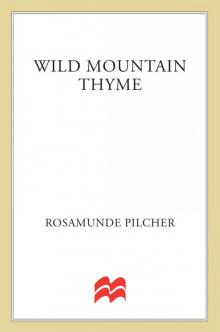 Wild Mountain Thyme
Wild Mountain Thyme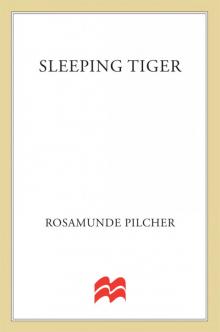 Sleeping Tiger
Sleeping Tiger Flowers in the Rain & Other Stories
Flowers in the Rain & Other Stories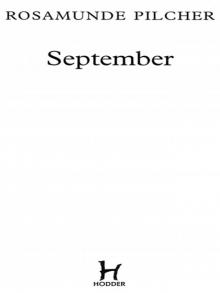 September
September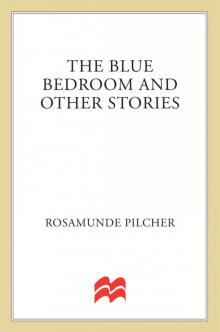 The Blue Bedroom: & Other Stories
The Blue Bedroom: & Other Stories The Carousel
The Carousel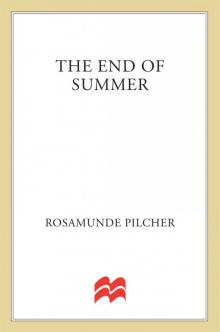 The End of Summer
The End of Summer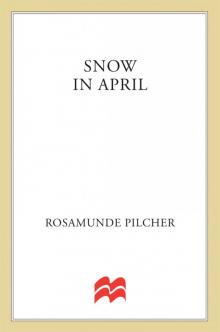 Snow in April
Snow in April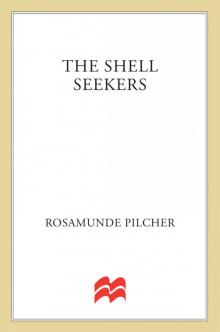 The Shell Seekers
The Shell Seekers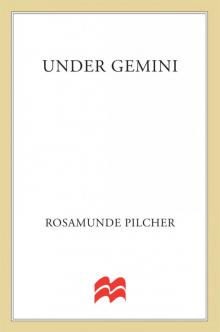 Under Gemini
Under Gemini The Empty House
The Empty House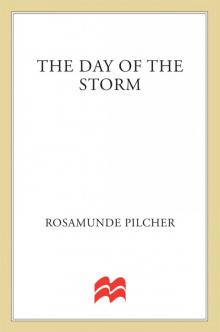 The Day of the Storm
The Day of the Storm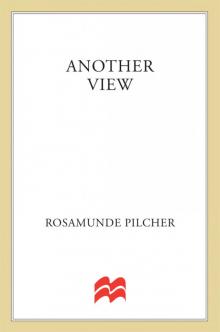 Another View
Another View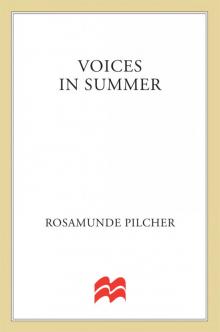 Voices in the Summer
Voices in the Summer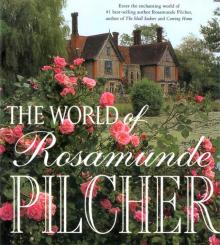 The World of Rosamunde Pilcher
The World of Rosamunde Pilcher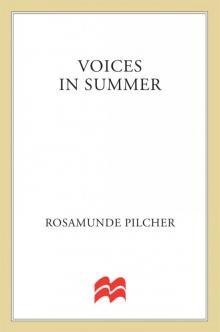 Voices In Summer
Voices In Summer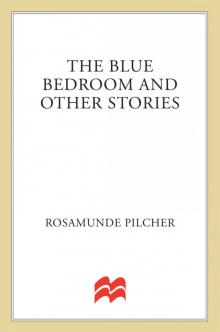 Blue Bedroom and Other Stories
Blue Bedroom and Other Stories